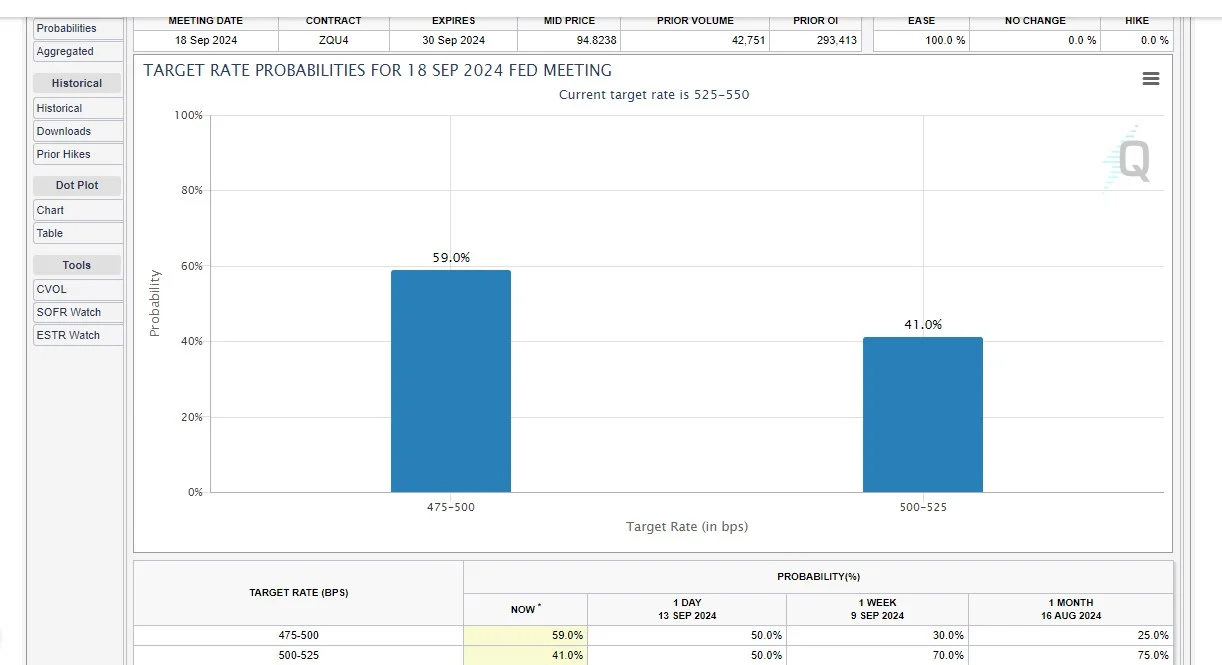Key Takeaways
- Bitcoin and Ethereum experienced significant drops in the past 24 hours.
- The market is increasingly expecting a more aggressive 50-basis-point rate cut by the Fed.
Bitcoin (BTC) slid by 3%, while Ethereum (ETH) dropped by 6% in the last 24 hours, ahead of a critical week when interest rate decisions by central banks will be under the spotlight. The overall crypto market cap currently sits at $2.12 trillion, a 4.5% decrease in a day.
Volatility returned at the end of the week as Bitcoin dipped to a low of $58,200 before recovering slightly to trade above $58,600, data from CoinGecko shows. The market remains divided, with bulls and bears clashing over Bitcoin’s future direction.
As Bitcoin pulled back, altcoins started to sink. Over the past 24 hours, Ethereum has been down as much as 6% to around $2,300 while Solana (SOL), Doge (DOGE), and Ripple (XRP) have dropped by around 5% each.
Among the top 100 crypto assets, Injective (INJ), Internet Computer (ICP), Pepe (PEPE), and Ondo (ONDO) posted the biggest losses at 7% on average, data shows.
The crypto market braces for more volatility as the Federal Reserve’s (Fed) rate decision is approaching. Economists warn that a 25-basis-point rate cut may lead to a “sell-the-news” event as the market has already priced in this adjustment.
Market sentiment regarding the Fed’s upcoming interest rate decision has dramatically changed. The CME FedWatch tool now shows a 41% probability of a 25-basis-point cut and a 59% chance of a 50-basis-point reduction.
The odds for the latter were only 30% last week and just stood on par with the odds for a 25-basis-point reduction yesterday.
Market participants appear to root for a 50-basis-point cut. In that scenario, economists’ anticipations are mixed.
Johns Hopkins University economist Steve Hanke told The Block that a 50-basis-point reduction could boost the crypto market.
“…a 50-basis-point cut is not factored in. If it were to materialize it would probably give the market a lift,” he said.
Nevertheless, an aggressive cut could signal a troubled economy, which may counteract optimism over rate cuts. According to 21Shares research analyst Leena ElDeeb, a potential recession could trigger selloffs across “risk-on assets in the short term.”
The Fed is expected to make its key decision on Wednesday, September 18. A rate cut would reverse the tightening cycle that began in 2022 and mark the first reduction since 2020.
Apart from the US central bank, eyes are also set on interest rate decisions by the Bank of England and the Bank of Japan.
The Bank of England is also scheduled to announce its next interest rate decision on September 19. The meeting will follow the recent cut in the bank rate from 5.25% to 5% on August 1, marking the first reduction since the beginning of the tightening cycle in late 2021.
Monetary policy committee members say they are closely monitoring the potential for inflation persistence even after inflation has been brought down to target levels.
The Bank of Japan is set to announce its interest rate decision on September 20. The meeting is closely watched as the bank has maintained a tightening monetary policy for years, with negative interest rates and yield curve control measures in place.
